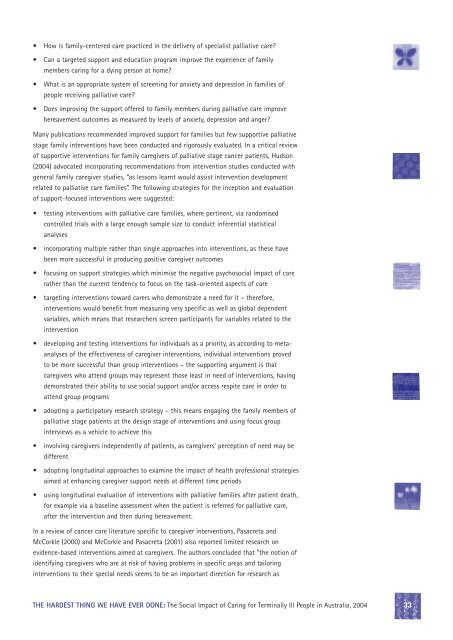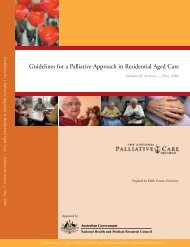The hardest thing we have ever done - Palliative Care Australia
The hardest thing we have ever done - Palliative Care Australia
The hardest thing we have ever done - Palliative Care Australia
You also want an ePaper? Increase the reach of your titles
YUMPU automatically turns print PDFs into web optimized ePapers that Google loves.
• How is family-centered care practiced in the delivery of specialist palliative care?<br />
• Can a targeted support and education program improve the experience of family<br />
members caring for a dying person at home?<br />
• What is an appropriate system of screening for anxiety and depression in families of<br />
people receiving palliative care?<br />
• Does improving the support offered to family members during palliative care improve<br />
bereavement outcomes as measured by levels of anxiety, depression and anger?<br />
Many publications recommended improved support for families but few supportive palliative<br />
stage family interventions <strong>have</strong> been conducted and rigorously evaluated. In a critical review<br />
of supportive interventions for family caregivers of palliative stage cancer patients, Hudson<br />
(2004) advocated incorporating recommendations from intervention studies conducted with<br />
general family caregiver studies, “as lessons learnt would assist intervention development<br />
related to palliative care families”. <strong>The</strong> following strategies for the inception and evaluation<br />
of support-focused interventions <strong>we</strong>re suggested:<br />
• testing interventions with palliative care families, where pertinent, via randomised<br />
controlled trials with a large enough sample size to conduct inferential statistical<br />
analyses<br />
• incorporating multiple rather than single approaches into interventions, as these <strong>have</strong><br />
been more successful in producing positive caregiver outcomes<br />
• focusing on support strategies which minimise the negative psychosocial impact of care<br />
rather than the current tendency to focus on the task-oriented aspects of care<br />
• targeting interventions toward carers who demonstrate a need for it – therefore,<br />
interventions would benefit from measuring very specific as <strong>we</strong>ll as global dependent<br />
variables, which means that researchers screen participants for variables related to the<br />
intervention<br />
• developing and testing interventions for individuals as a priority, as according to metaanalyses<br />
of the effectiveness of caregiver interventions, individual interventions proved<br />
to be more successful than group interventions – the supporting argument is that<br />
caregivers who attend groups may represent those least in need of interventions, having<br />
demonstrated their ability to use social support and/or access respite care in order to<br />
attend group programs<br />
• adopting a participatory research strategy – this means engaging the family members of<br />
palliative stage patients at the design stage of interventions and using focus group<br />
interviews as a vehicle to achieve this<br />
• involving caregivers independently of patients, as caregivers’ perception of need may be<br />
different<br />
• adopting longitudinal approaches to examine the impact of health professional strategies<br />
aimed at enhancing caregiver support needs at different time periods<br />
• using longitudinal evaluation of interventions with palliative families after patient death,<br />
for example via a baseline assessment when the patient is referred for palliative care,<br />
after the intervention and then during bereavement.<br />
In a review of cancer care literature specific to caregiver interventions, Pasacreta and<br />
McCorkle (2000) and McCorkle and Pasacreta (2001) also reported limited research on<br />
evidence-based interventions aimed at caregivers. <strong>The</strong> authors concluded that “the notion of<br />
identifying caregivers who are at risk of having problems in specific areas and tailoring<br />
interventions to their special needs seems to be an important direction for research as<br />
THE HARDEST THING WE HAVE EVER DONE: <strong>The</strong> Social Impact of Caring for Terminally Ill People in <strong>Australia</strong>, 2004<br />
33
















